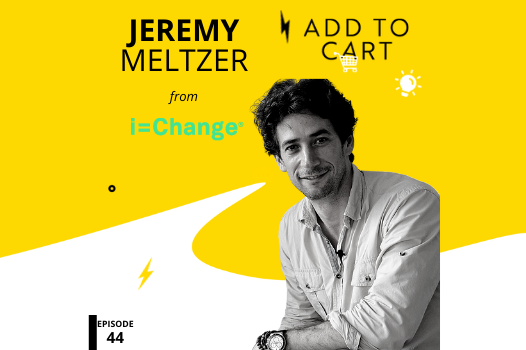In this episode of Add To Cart, we are joined by Jeremy Meltzer from i=Change. Jeremy and his team have raised over $2m to help women and girls escape out of poverty, abuse and slavery, partnering with brands such as PE Nation, PillowTalk and National Tiles.
Jeremy discusses the impact that i=Change is making, how retailers can start giving (and converting) almost immediately and why he thinks the secret to retail in the future will be product as well as purpose.
“This is not just responsibility for the sake of it. This is good business. It’s ethical business, it’s smart business…and anything else is actually becoming dumb business.“
Jeremy Meltzer
Questions answered in this episode include…
- What inspired you to start i=Change?
- Tell us about the link between adding i=Change and the commercial uplift you are seeing with your retailers
- What’s the most challenging part of running a social enterprise in Australia?
An eye-opening journey that inspired i=Change
“When I was a kid, we used to go to Fiji and actually stay in the villages a lot. And I saw a lot of poverty. We would travel through Southeast Asia as a family. And I was always a very sensitive little boy and still very sensitive. I was just always moved by the poverty that I saw.
And then I lived in Cuba in Havana when I was 21. I lived there for four months. I had a Cuban girlfriend and I lived in the community. I heard very quickly and very regularly stories of violence from her girlfriends from the men who were their husbands partners and boyfriends.
I think I was just a shock to hear that they thought that’s just what men do. They thought that’s the most normal thing in the world. They even expected it from me. And I remember thinking what the hell is going on here?
I thought, what difference could I possibly make, especially as a man and how could I get out of my own way in terms of my bias? So every opportunity I had to travel from then I met with NGOs who focused on the empowerment of women and girls. And I have sat with impact leaders now in probably 20 countries. People who are devoting their lives to specific issues in specific communities. And they’re really doing it extraordinarily well.
It’s very complex work. I just sat, listened, took notes and asked questions. Of course, they all needed more money to do their work. And a small amount of money, espeially in the developing world can go a long way. It can build schools and it can lift up communities by getting girls into schools. It can work to end violence. It can build shelters. It can stop girls getting married off. It can stop female genital mutilation. It can feed people. I mean, the things that we take for granted, a small amount of money can have an incredible impact.
That was the genesis of the why. And then the entrepreneurial spirit kicked in. I thought, how do we use the power of business? How do we use the power, more specifically, of retail to turn that into a force for good to appeal to consumers?
I sort of instinctively felt consumers must want to buy from brands that give back? That must be a good thing, right? So how do we make it simple for retailers? It hasn’t been part of the toolkit of retail.
Retail has been about maximizing profits, which has been the modus operandi of business. There’s nothing wrong with that but yet everything’s changing now. Everything is changing and it’s being driven by consumers and driven by a sense of deep urgency around this pivotal time in history. And so we’re really at a very interesting moment for this whole movement of purposeful business and purposeful retail. We’re very proud to be playing a part in that.”
Giving creates a proven uplift for retailers
“We believe that if brands can measure and AB test a normal product and promotion messages compared to their giving messages, it will be really interesting to see what converts higher. You would expect that the product or promotion messages would always convert higher. It’s actually shown not to be the case anymore. We have data now showing that.
For example, Seafolly recently split test their paid advertising to literally test that very result. And what they saw was the ad set that was around product, which is their normal messaging versus the ad set around the giving messages drove a hundred percent increase in conversions. They were blown away by that. It also drove a hundred percent return on ad spend in ROAS. And overall that one campaign that they ran paid for their donations 2.7 times over. It was 170% ROI because we looked at the new revenue that the ad set on their giving drove.
Now that is, I think in anyone’s book, a very good return we’re seeing, and that’s been proven a few times over now. Both Australis and Sodashi have also seen close to a hundred percent increase in conversions.
National Tiles recently ran a test and they saw that they added giving messages to their Instagram bio and suddenly it drove a hundred percent increase of customers moving from the Instagram bio onto their site, versus when they didn’t have the messaging that they give back from every sale. And we checked and we said, “are you sure?” They said, yes, we haven’t done anything else to the Instagram bio. We just added that we give back from every sale and we had a hundred percent uplift in people moving from the bio onto the website. So it is really interesting and really powerful.”
Existing for something bigger than product and profit
“There have been lots and lots of frustration (because) it’s a new business model. People have just struggled to get their head around it, which I totally understand.
You know, it’s not a not-for-profit, it’s not a for-profit business… It’s just doing something that is really authentic to who you are that reflects your why, because that’s going to be authentic across your comms and that’s going to consumers and your customers will respond to it because it is heartfelt and it is true.
As hard as it is, and we’re a tiny team, we’re scrambling. We’re working almost seven days a week. But I still feel very humbled and honored to be able to do this. Once they start giving back, they unlock so much creativity, that they start talking about their impact and the people’s lives they’re changing and their staff get excited.
So there’s a whole piece there around unlocking the passion of staff, who are now working for a business that is bigger than product alone. And there’s a lot of studies on this, showing that you unlock what they call the ‘discretionary output’, which you can’t buy with a salary, when your team knows that you exist for something bigger than product and profit.
And that of course has also significant value and impact on their bottom line, which again makes that dollar from every sale, a really important part of the brand.”
Links from the episode
- i=Change
- Grill’d
- Dr Barry
- By Charlotte
- Camill
- PE Nation
- Pillow Talk
- Seafolly
- Australis
- Sodashi
- National Tiles
- Paul Polman, Unilever
- Shopify
- Larry Fink, Black Rock
- Patagonia
- Julie Mathers, Flora & Fauna
- Jeremy’s Ted Talk, ‘Where is Men’s Roar?’
- Pandora Jewellery
- UNICEF
- Afterpay
- Signet and Lush Cosmetics (sponsored)
- Shopify’s The Future of eCommerce report (sponsored)



